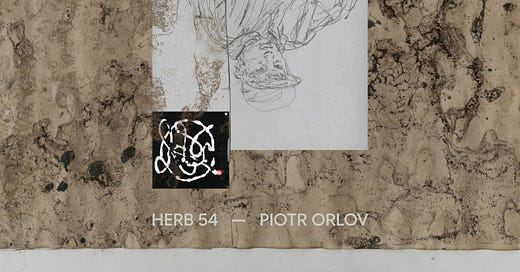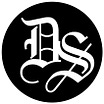Herb Sundays 54: Piotr Orlov
The NYC-based journalist and musical storyteller delivers his "youthful immigrant journey" in playlist and essay form.
herb sundays 54: Piotr Orlov - apple / spotify. art by Cina.
Of all the professions I’ve wanted to emulate (a fact belied by this unedited newsletter), the role of the journalist is high up there. Getting to meet Piotr Orlov (and his equally impressive partner, the photographer Kate Glicksberg) alongside a small cabal of NYC journalists in the early ‘00s has been a big part of my musical development. When I arrived in NYC as an eager kid, riding Spirit Air flights as often as possible from Ann Arbor, I bonded quickly with the music journalist set including folks like Mike Rubin (fellow UofM grad/Detroit techno head), Andy Battaglia (now one of my favorite art writers), Simon Reynolds (Herb 32), Joey Patel (now dripping in award gold after producing the excellent Summer of Soul), Adrienne Day (who still owes me a mix), and Eric Demby (the Brooklyn Flea king). While just a tiny bit older than me, these writers formed a network of big brothers/sisters who tolerated my Midwestern thirstiness. They let me tag along to events, checked out and often covered the new Ghostly releases, and were kind and cordial. When we as a label misstepped (Joe’s Pub 2004 is another story for another day), they’d also let me know. Even though only a hair older than me, I saw them as the cool Gen X’ers who were serious about the right things, but open-minded to new stuff. This group of enthusiasts also included the Other Music shop team, Justine D and co. at Studio B, publicists Gamall Awad and Roy Dank, and Jonathan Galkin, who I loved swapping records with at the DFA offices.
While I was looking for coverage of our acts, this network soon became (at least what I perceived to be) actual friendships. My guide to meeting them was often cold opens in emails. My guidebook to the maze was an oddly procured list of journalist addresses I acquired around 2001 after I approached a well-known publicist with our second and third releases that I felt had press potential. They wouldn’t take us on as a client but we somehow arrived at the idea that I’d acquire their PR list for a fraction of the cost. So armed with this, I quickly set out, taking coffees when able or meeting at events while I was in NYC. I was pretty shameless (bringing The Village Voice’s Tricia Romano soup when she was sick, for example) but it seemed to work and I still remain friends or pen pals with this crew.
When I first started the Herb Sundays series, Piotr and I discussed him making a mix, being the beacon of good musical taste he embodies. Well, P has bided his time and made a truly exquisite Herb here, complete with an essay. It’s a treatise on herbalism and it's totally lovely. The mix is master-level Herb, a storybook of pop that feels political, with songs that come to have second and third meanings in his hands.
Orlov is a music lifer. When I think I’m a music fan and then think of his story, I move myself down the ladder. He’s also been gracious with his time and thinking back to most of the pivotal ghostly events, he was present, like a proud uncle. I look up to Piotr in many ways, including that he was an early dad in my peer group, and seeing him and Kate on the town, even when they were new parents, gave me hope that it could be done. I also love that he lives emotions out, on his sleeve as it were and that he's all in. No one is more passionate. Let's dive in, shall we….
Piotr Orlov (feel free to call him “Peter”) was born in St. Petersburg back when it was still called Leningrad and arrived in New York in the late 1970s. Though he is first and foremost a writer and editor, over the past 25 years Piotr has worked as a music storyteller in many capacities, at various platforms and institutions. His writing has appeared in publications such as the New York Times, Rolling Stone, Esquire, Pitchfork, The Guardian, and Village Voice, among many others. Piotr has spent time as director of special projects at AFROPUNK, a senior editor of content at NPR Music, and as an editorial director at MTV. In 2003, he co-curated the music program of The New Museum art exhibition, “Black President: The Art & Legacy of Fela Kuti.”
Starting in 2021, he has been producing/hosting the monthly interview + music radio program, Dada Strain Radio on the Sonos Radio Network (also a substack), focused on rhythm, improvisation, and community. He is an adjunct teacher at NYU’s Clive Davis Institute of Recorded Music, and Columbia University’s School of the Arts.
And now the essay.
Naturalized Herb!
By Piotr Orlov (aka raspberryjones aka Dada Strain)
I came to America as a seven-year old, and spent most of my youth trying to catch up culturally. Identifying as an herb felt an instinctive part of the “immigrant kid adjusting” process — though exactly what “herb” meant remained open to interpretation, and still does. Music is a key part of my family’s lore. In the USSR, one grandmother was a classical musicologist, my parents played Western jazz and rock and roll records, and the samizdat songs of then-contemporary Russian singer-songwriters, whose late-night, DIY gigs my uncle occasionally helped put on in Leningrad. So it was kind of inevitable that music would become a major part of my assimilation. Popular sounds went from curios to hobbies to gateways to mania, before splintering into directions, tastes and pursuits that have formed my historical narrative and a soundtrack of an internal life, a way to face the world. (Plus a career of sorts, I guess.)
What made me a musical herb in these circumstances was not simply obsessing over records and styles and scenes, but evaluating the meaning they were bringing to my new life. Heavy is the burden of arriving from a literary land that values interpretation; heavier still is developing an omnivorous appetite for the multitude of a new country’s pop-culture flavors, with a desire to understand why some were regarded in opposition to one another: what was cool, what wasn’t. (What???) It was an education in Western pop-think, in American (and New York) tastes, and a mapping of a path — even if my simultaneous love of punk and classic rock, AOR hits and new rap songs, Top 40 and heavy metal and synth-pop was strange to those who segregated along tribal lines. Though there’s no way I’d have been able to put it this succinctly back then, my biggest musical thrills came when seemingly separate subcultures interacted on common ground. Sometimes these interactions spawned “hits” made out of disparately celebrated parts. (Though it seemed obvious that it was all rooted in the same source, and that people arguing between, say, disco and new wave, or rap and punk were involved in double-speak.)
The songs that fell between strict affiliations, that transcended divides and maybe even crossed over to a wider audience, embodied who I thought I was in America, sowing the seeds of *my* unified theory of herbology before I recognized it as one. Herb was the opposite of cool, and hits made more sense transcending borders than secret treasures did. (The purpose of secret treasures was only barely coming into view.). Not all “hits” of course, but in the mid-’80s—when pop made room for Michael, Bruce, Madonna, Prince, Van Halen and Run DMC (to name just a few artists I loved); when New York’s clubs (to which I started going as a teen) and MTV and the music press (which I beg obsessing over at the same time) were constantly adding new styles and fashions to what we considered the mainstream; while rap music (and other street-beats) percolated all around us—the notion of a “hit” seemed much broader. It was a kind of daily churning poptimist reality before such a thing needed critical definition.
The other element my herb soundtrack required was a specificity of language. Son of a journalist, grandson of music historian, I was a writerly kid, learning a new dialect (many types, actually - some I never did get the hang of). The words of songs I was listening to and picking out, mattered in the formation of my new identity. During formative years, concepts like “irony” or “stream of consciousness” were beyond me, so it was left to sincere lyricism, and an intensity of belief to guide me in this transition between Cold War-ing countries and hormonal surges. There was, as you can maybe tell, a lot of inner searching and self-reflection going on, inquiries that became sources of character development and community aspiration. Singing these songs with friends, at the top of our lungs, like nothing else mattered, that’s where I wanted to be. It now reeks of survival and need for recognition, a desire for safety and comfort and love, aspiring to universal understanding. Even then I knew these songs weren't everybody’s reality—and I too tried on other realities. (In the end, some of them fit better than a populist worldview.) But this mixture of multi-subculturalism and principled sincerity, in the form of words and music, was one that defined me at my core at a time when a person was forming. That’s the inner herb I’ve been stuck with ever since, and in some way, those standards continue to guide me.
Which is all to say that my belabored contribution to Herb Sundays is no one’s idea of a “discovery” playlist, unless the revelation you for some reason seek is one youthful immigrant journey. That’s the story this wannabe-mixtape tells (designed to be played 1->58 — but, yes. also imminently shuffle-able), consisting of hits that cross 70s/80s/90s cultural bridges, sprinkled with oldies and currencies that fit ensuing times and conditions, and which contain certain lyrics that sound just right screamed out the driver’s side window, as the first moisture of unexplained tears dots the sockets. It’s neither too hard (I can do an entire “rock” one of these), nor too dancey (ditto), devoted to a soul-heavy mid-tempo (or slower), with a touch of schmaltz. More than anything else, it is a “songwriters” playlist, not by and large from the icons of their times but one-hit wonders, back-dated boldface names, or cover versions that said a thing just to the left of the original. (I learned a lot from covers.)
In the year-plus I’ve been overthinking this playlist, making and re-making it, contemplating and then writing about its purpose, a few of these already-popular songs acquired new storylines. Some in TV shows with discerning music supervisors, others in think pieces by content writers brewing reframed narratives from Internet tea leaves, others as subjects of hi-design schwag that mixes ironic distance with novel ideas of cool. I’ve loved it every time it happened: whoever thought enjoying, say, “Orinoco Flow” or Donna Lewis, way back when, would put you on the approval matrix? (Even at the late stage of copy-editing these, it feels pertinent. #RIPRamesyLewis) Many of these songs continue to be played at the less-hip supermarkets and cafes near you, which is where I feel their impact most: thinking about what a long way we’ve all come together, and still wondering just how far a well placed “it’s alright” can actually take us.







